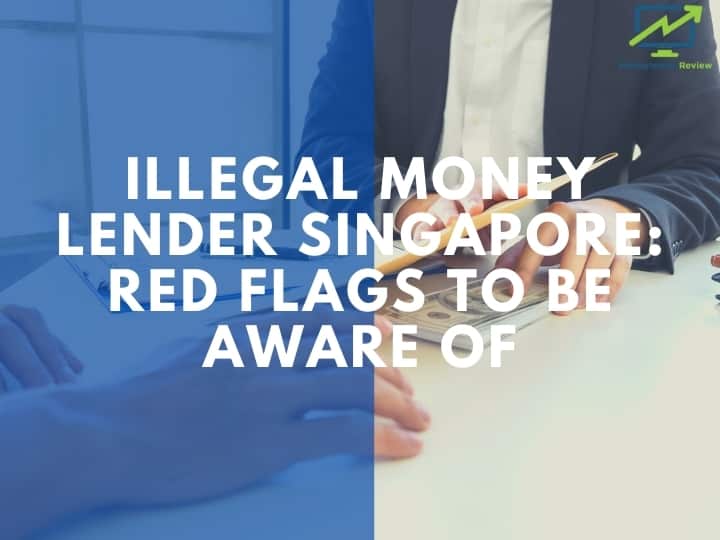Moneylenders Do’s & Dont’s When Collecting Debts in Singapore
When you need to tide over tough financial situations, who do you call?
Singapore residents usually rely on family and friends or banks for emergency financial assistance. Unfortunately, there are some who are tricked into borrowing from loan sharks.
Loan sharks are notorious for charging high interest rates, enforcing unfair penalties, and intimidating borrowers. In fact, there was a report last year where a flat in Jalan Tenteram was found to have been sealed with a bicycle lock. Loan-shark-related graffiti was also found scrawled on the walls beside the gate.
This is just one of the many loan shark harassments that one might experience when dealing with unlicensed moneylenders. So how do you spot loan sharks to avoid doing business with them?
Licensed Money Lenders vs. Loan Sharks
When you need urgent cash, borrowing from
a licensed money lender in Singapore is a viable alternative to a typical bank loan. However, there has been a rise in loan shark activities and they masquerade as “licensed” moneylenders. They prey on innocent individuals who don’t know how to differentiate between a licensed money lender and loan sharks.
To help you make smart, informed choices, here’s how to spot a licensed money lender:
- Registered Under The Ministry of Law
The main difference between legal money lenders and loan sharks is that the former is operating legally. Credible money lenders are approved lenders and registered under the Ministry of Law. Verify the money lender’s license by checking the complete list of licensed money lenders on MinLaw’s website.
- Thoroughly Explain the Terms of Your Loan
A licensed money lender is required by law to thoroughly explain the terms of the loan to you in a language you understand. Here are the things you must fully understand before signing a loan contract:
- Loan amount
- Repayment terms
- Late repayment fees
For example, if you are not familiar with English, you can request a loan officer who speaks your language. In doing so, you can fully understand the terms and conditions of the loan.
A loan shark, on the other hand, will immediately grant you a loan without discussing the terms and conditions. These unlicensed money lenders will try to keep you in the dark.
- Provide A Loan Contract
Taking a loan from a licensed money lender is legally binding. That said, the licensed money lender must provide you with a complete loan contract. It must have all the details about your loan, including the principal loan amount, tenure, monthly interest rate, and repayment schedule.
A loan shark will either make you sign a blank contract or will not provide you with one at all.
- Verify Your Identity
Licensed money lenders are required to exercise due diligence. They need to verify your identity through a face-to-face appointment before approving or disbursing your fast cash loans. This also means that signing the loan contract must be done in person at the legal lender’s business address.
A loan shark will approve loans over the phone, by SMS, or via email. Some even approve loans before receiving your loan application form and other supporting documents.
- Charge Only 3 Types of Fees (Excluding Interest)
The interest rate that a licensed money lender can charge is capped at 4% per month. On top of the interest rate, they are also allowed to charge three types of fees:
- A late repayment fee not exceeding S$60 for each month the loan is repaid late
- An administrative fee not exceeding 10% of the principal loan. This is charged when the loan is granted.
- Legal fees
Red Flags and Common Ways Loan Sharks Operate
- Masquerade as a licensed money lender but not registered in the Registry of Moneylenders.
- Send unsolicited spam messages through SMS, WhatsApp, emails, and social media platforms.
- Charge sky-high interest rates
- No limit to how much borrowers can borrow
- Ask for loan processing or administrative fee before the loan is approved
- Unlikely to have a business address
- Resort to loan shark harassment, threats, or intimidation to get debtors to pay up
- Retain your NRIC card or other personal IDs, such as passport or work permit
- Will not provide a loan contract
- Approve and disburse cash loans without face-to-face meetings at all
- Fail to assess the borrower’s financial standing and income
- Withhold any part of the principal loan for any reason
What Can a Licensed Money Lender Do?
Remember, all the activities of a licensed money lender in Singapore are strictly regulated under the Moneylenders Act. This includes keeping your personal information confidential and private.
So what will a licensed money lender do if you fail to repay your loan?
Typically, they will outsource help from debt collection agencies. These debt collectors will chase the debts on behalf of licensed money lenders. Rest assured that these debt collection agencies comply with the industry’s Code of Ethics set by the Credit Collection Association of Singapore (CCAS).
If you are struggling to make repayments, the licensed money lender can:
- Reach out to your family, relatives, or friends. They will talk to them about the money you owed.
- Negotiate repayment terms that are suitable to your financial capacity. Debt collectors can serve as a mediator between you and the licensed money lender:
- You can propose a new repayment plan
- They can offer other repayment solutions

What a Licensed Money Lender Cannot Do
When borrowing from a licensed money lender, it’s crucial to be aware of your rights as a borrower. Additionally, you need to protect yourself from potential illegal and abusive tactics. Here are things you should watch out for:
1. Harassment, Threats, and Intimidation
You are already aware that loan sharks are notorious for abusive and harassment tactics. However, if a licensed money lender starts to resort to harassment, threats, and intimidation, it’s time to contact the authorities.
According to the Protection From Harassment Act, no one is allowed to:
- Threaten anyone with personal injury or cause damage to your property
- Be abusive towards you or your loved ones
- Insult you or your loved ones
- Verbally intimidate you with vulgarities
The Act states that anyone who exercises such tactics may be liable under the penal code for criminal intimidation.
2. Stalking
Debt collectors or licensed money lenders cannot monitor or follow your movements. This act is considered an act of unlawful stalking under the Protection From Harassment Act.
Stalking constitutes:
- Persistently and intentionally following you or your loved ones
- Constantly being in the same places as you
- Going to places where you frequent even if you are not there
- Monitoring your movements
3. Causing Harm or Injury
Causing physical harm to anyone is a serious offense in Singapore. The offender may face imprisonment of up to 2 years or be fined S$5,000 or both. Anyone found guilty of grievous injury resulting in fractures, dislocations, or disfigurements can lead to 10-year imprisonment as well as a fine or caning.
4. Vandalizing Your Property
Under the Vandalism Act, no one is allowed to deface property or write profanities on public spaces. Debt collectors or licensed money lenders are also not allowed to paste notice of debt collection or put flyers around your home or workplace. Violating the Act can lead to a fine of about S$1,000.
5. Damaging or Taking Your Property
Never believe any debt collector or licensed money lender who threatens to take away your house, car, or other possessions. They don’t have the power to seize control of your assets without a Writ of Seizure and Sale from the Singapore Courts.
Additionally, they cannot damage your things. If they do, they will be punished with imprisonment of up to a year, a fine, or both under the Penal Code. Note that they don’t have to wreck your assets to be punished. All it takes is some damage that reduces its value or usefulness.
6. Engaging in Unlawful Assembly
Debt collectors or licensed lenders cannot intimidate you with a mob. If a group of at least five people comes to you to intimidate you, it is considered an unlawful assembly. This act is punishable by a jail term.
What if it’s only three or four people? This act is still considered harassment or intimidation.
Note: Never assist loan sharks in their activities. If you are found to have opened a bank account and gave away your ATM card along with your PIN to be used to facilitate money lending, you will be presumed to have assisted in unlicensed moneylending. This is punishable by imprisonment, fine, or both.
| Licensed Money Lenders | Loan Sharks | |
| Legality | Legal | Illegal |
| Maximum Loan Amount | Unsecured loans will depend on the borrower’s minimum annual income – up to 6x monthly income | No limit |
| Interest Rate per Month | Capped at 4% per month | Astronomical |
| Fees and Charges | Only 3 types of fees. The administrative fee is charged after loan disbursement | Charges fees even before loan approval |
| Loan Contract | Yes | No |
| Disburse Loans Remotely | No | Yes |
| Unsolicited Spam Messages | No | Yes |
| Abusive Language and Harassment | No | Yes |
Where To Get Help
A licensed money lender in Singapore will follow the rules and regulations set by the Ministry of Law. Additionally, they will follow the code of ethics set by CCAS, especially if they are a member of the association. That said, they will be reasonable when following up on debts. Find out more on the best Licensed money lender in Singapore
But in the event that you encounter loan shark harassment or situations where you are intimidated, you must:
1. Alert the authorities
If you feel threatened, immediately call the police. The police officers can clarify whether the money lender broke the law. They will also advise you on the next best course of action.
Feeling in danger? You can ask for a Protection Order against the individual who harassed you. Going to the authorities will protect you from immediate danger. As such, you will have time to work out your loan repayment scheme.
2. Send a complaint to the Credit Collection Association of Singapore (CCAS)
Contact the CCAS to mediate between you and your legal money lender. The CCAS can help you reach a resolution with the money lender. Here’s the catch: this is only possible if the legal lender or debt collector is a member of the association.
Unfortunately, if you borrowed from a loan shark, CCAS can’t help you.
3. Negotiate a new repayment plan
This option is a win-win solution for you and the money lender. Negotiating a new repayment plan that suits your financial capacity will help you pay off your debt. Plus, it also ensures that your credit rating stays good enough.
Here’s what you can do:
- Come up with a strategy and discuss it with your licensed money lender
- Ask your debt collector to mediate between you and your lender
- Contact the CCAS for assistance
4. Lodge a complaint at the Registry
Lastly, you can also contact the Registry at 1800-2255-529.
File a complaint against legal money lenders who engage in unfair practices and/or contracts. The Registry will not disclose your details without your consent. Most importantly, they will investigate your complaint thoroughly.
You can also take this complaint through the Small Claims Tribunal or the Court under the Consumer Protection Act. The Court can set aside loan transactions that are exorbitant and unfair.

What if you still cannot pay the debt?
- File for bankruptcy. If your debt amounts to at least S$15,000, you can file for bankruptcy. This will prevent your debt from escalating.
- Opt for a Debt Repayment Scheme (DRS). This option is best for debts not more than S$100,000. This scheme is not free and will appear on your credit history report.
If you qualify, an Official Assignee (OA) will determine whether you are suitable for the scheme. If so, they will work out a Debt Repayment Plan suitable for you. Under this scheme, you will have to repay your debts in five years.
- Contact Credit Counselling Singapore. This is a non-profit organization that specializes in offering support to individuals fighting debt
- Approach Social Service Agencies. Aside from Credit Counselling Singapore, there are also other social service agencies that help borrowers recover from serious debt problems. They provide general credit management information as well as assistance in negotiating debt repayment plans with lenders.
Closing
If you find yourself in a dire financial situation, always seek legitimate help. Don’t turn to loan sharks for fast cash. Instead, you can consider taking a personal loan and debt consolidation plan from banks. If you don’t qualify for such credit facilities, taking a loan from licensed moneylenders is a viable alternative.
Key Takeaways
- Always verify the credibility of the licensed money lender. Check the complete list of licensed money lenders from MinLaw’s website.
- Be aware of the maximum loan amounts and interest rates that licensed money lenders can charge. Their interest rates are capped at 4% per month.
- Licensed money lenders are prohibited from resorting to harassment, threats, and violence in pursuit of collecting a debt.
- Immediately contact the authorities and file a complaint at the Registry for any unfair and abusive practices.
Make finding the right licensed moneylender fast and easy. Moneylender Review offers free, unbiased, and up-to-date reviews to help you compare loan plans and make informed financial choices.




